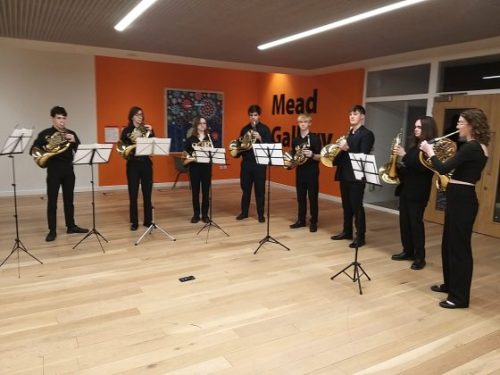 United Kingdom Howard, Smetana, R. Strauss: National Youth Orchestra / Sir Mark Elder (conductor). Warwick Arts Theatre, Coventry, 6.1.2024. (CP)
United Kingdom Howard, Smetana, R. Strauss: National Youth Orchestra / Sir Mark Elder (conductor). Warwick Arts Theatre, Coventry, 6.1.2024. (CP)

Dani Howard – Ascent (world premiere tour)
Smetana – Vltava
R. Strauss – Alpine Symphony, Op.64
One hundred and sixty-four young musicians in residence for eleven days of workshops at Warwick University always promise remarkable results. 2024 proved to be a vintage year. Pre-concert undertakings ‘to make something extraordinary happen’ were totally vindicated; an evening with those talented National Youth Orchestra (NYO) musicians is like no other at Warwick’s Butterworth Hall.

Dani Howard’s Ascent – enjoying a world premiere tour with NYO – is a most unconventional work, requiring seventeen horn players to process on stage, turn their backs to the audience to encourage a dialogue with other brass members in their conventional places, before moving synchronously sideways in both directions, stamping together, before returning to face the audience simply to blow into their mouthpieces without making a sound. This complicated exercise is completed without a conductor, relying on a dedicated percussion player to maintain order and timing by striking a wood block with a mallet. Howard’s work is a follow-up to her remarkable 2021 Jigsaw, a work inspired to ‘lift off and lift up’ young musicians during the pandemic. Ascent accompanies Strauss’s Alpine Symphony, introducing the offstage brass so familiar with this enormous work. NYO welcomed back a number of alumni musicians to fill those positions – a very pleasing reminder that the NYO family is for ever, a point well made by Sir Mark Elder, proud to have been a NYO bassoon player in his youth.
Preceding the monumental Alpine Symphony, NYO chose the second, for many the most popular, of the six glittering symphonic poems of Má Vlast. Vltava evokes the flow of this great river from its source in the Bohemian Mountains to the city of Prague. From babbling brooks depicted by warbling flutes and pizzicato strings, the work progresses through the tumultuous dissonance of the rapids with four harpists and piercing piccolo players enjoying the limelight. As the river’s volume grows a thicker orchestration grows too with those formidable horns taking control. Patrons at Warwick heard evidence of the skilful horn playing and their power during pre-concert showcases in the Butterworth foyer – now a feature of NYO visits, evidence of the outstanding rewards from those eleven days in residence. Beyond the white water of the rapids the music adopts a more regal approach as it progresses past the castles which were at one time the seat of power of Bohemian kings. Sir Mark Elder remains the most empathetic of conductors, coaxing and encouraging his young charges through tricky changes of pace, to which the players responded with considerable authority. Wonderful wind-played rich folk tunes giving way to dominant sparkling percussion heralds the return of shrill string playing, after which, finally, Vltava fades musically to something of a trickle. Then, those two climatic chords in the hands of one hundred and sixty-four players bring the symphonic poem to a close.
With just a short break, during which Sir Mark reminded patrons why the monumental Alpine Symphony is seldom performed, the vast orchestra began the fifty-minute extraordinary work which traces the twenty-four hours of the fifteen-year-old Strauss’s clamber across an Alp. From a 2am start, the work reflects the several episodes of the twenty-four-hour journey – the exhausting climb to the summit of the Alp recognised by a single oboe line – through the storms to the beautiful and serene conclusion. However, in 1912, when Strauss began composing the work there were storm clouds of another kind in the distance.
Ten first violin desks give an indication of the size of the orchestra assembled; the appearance of four Wagner tubas, the playing of the heckelphone by Alasdair Cottee, the use of a wind machine and Joshua Gearing’s appropriately flamboyant timpani playing, all adding to the most astonishing performance. There were frightening moments with the Apparition, discordant cow bell playing in the Alpine Pasture and clever interpretation with offstage horns of the Wrong Path with Wagner tubas held responsible for the incorrect route!! Tricky moments On the Glacier were splendidly surmounted; principal cellist Andrew O’Reilly’s four-bar solo in Dangerous Moments was perfectly performed; joint-principal oboeist Daniel Fergie was note perfect, too, in his solo which is a moment of reflection on the Summit. As Strauss looked forward from the summit on his venture to complete the Alp journey in Vision, the sun begins to rise and a storm is clearly on its way. However, before this overwhelms everything we were treated to the heckelphone, an instrument only used by Hindemith and Strauss. Resembling a bassoon, one octave below an oboe, the Cottee solo was a very rare opportunity to hear the instrument expertly played in the Calm Before the Storm
Piercing piccolos, wild wind machine turning, shaking of the thunder sheet and frantic twin timpani playing greeted the storm and the start of Thunder and Tempest, creating an almost terrifying volume of noise seldom, if ever, experienced at the Butterworth Hall. Rather than restrain his charges, Sir Mark permitted enthusiastic playing throughout Sunset and Quiet Settles, a mark of respect he has for these bewilderingly talented young musicians. With the twenty-four-hour venture complete, Night returned. Fortunately, a long pause was gifted to conductor and players before the well-deserved explosion of applause. Much to the amusement of patrons, Sir Mark momentarily lost the offstage horns as they arrived to take a bow – they had returned by a different door!!
When composing the Alpine Symphony, Strauss was engrossed in soul-searching following the death of his friend Gustav Mahler after a twenty-year friendship. There will have been soul-searching of a different nature amongst patrons – would such a remarkable performance of the work ever be heard again in Warwick in their lifetimes?
Clive Peacock
